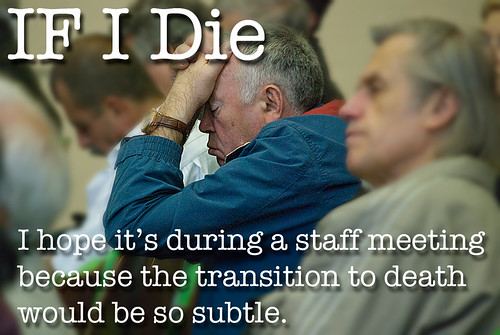In schools this concept is already well-established but now the focus is moving to reinventing the dreaded staff meeting. An article on TeachThought, 5 Challenges We Overcame Moving To A Flipped Staff Meeting, offers advice to managers who realise that their staff meetings have become stale rituals.
What if teachers could go to staff meetings and be actively collaborating? What if teachers looked forward to going to staff meetings? What if teachers could leave a staff meeting having been fully engaged for its entire duration? What if staff meetings were the place to learn, innovate, and transform teaching practices?
Some people may of course appreciate being passive for a while and getting the information they need in one convenient meeting. However what I notice today is that the information provided at meetings is more relevant to some than to others and as a result many people check their e-mails, prepare coming activities or simply get nervous as they realise they have many better things they could do with their time. I'm sure all meetings would benefit from a flipped approach and that active participation and involvement would also eliminate most multi-tasking. If people are actively involved then they won't have time to even think of multitasking.
However the article warns that attitudes are hard to change and that shifting to more active and meaningful meetings means abandoning past practices. There will be objections at first; the traditional meeting is comfortable and passive. You're asking people to do extra work and to come to meetings we--prepared rather than just showing up at the last minute. But if the extra work results in more informed and committed staff (or students) who see staff meetings as an opportunity for learning and development then the effort is well worthwhile.
Changing the way you do staff meetings is going to be a mindset shift for everyone. Attending a traditional staff meeting, although boring, tends to be pretty easy. You just have to sit there. And now teachers will not only have to be active during the staff meeting, but also watch a screencast prior to the meeting. My advice is to trust the process. Once everyone realizes the benefits of flipping staff meetings, people’s mindset will begin to change.
However the article warns that attitudes are hard to change and that shifting to more active and meaningful meetings means abandoning past practices. There will be objections at first; the traditional meeting is comfortable and passive. You're asking people to do extra work and to come to meetings we--prepared rather than just showing up at the last minute. But if the extra work results in more informed and committed staff (or students) who see staff meetings as an opportunity for learning and development then the effort is well worthwhile.

Alastair - Thank you for your post on my article!
ReplyDelete